update 25.
beaches and bush
23 August 2008
Total kilometers cycled: 39,746 (26,642 miles)
Cycling through Mozambique
Specific country info on routes & roads/food & accommodation/the locals available here.
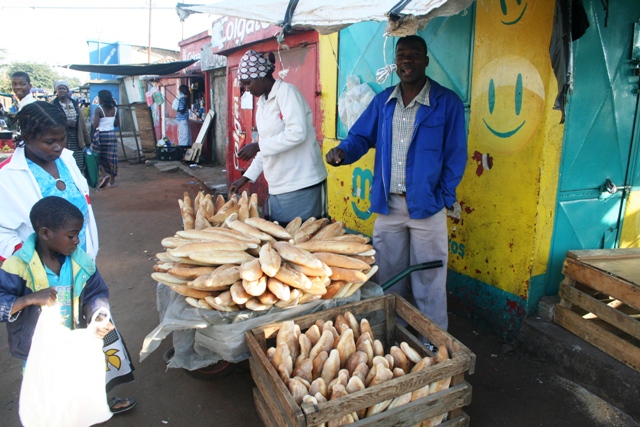 Night
is fast falling on our first day in Mozambique and we still have no
idea where we'll sleep. The capital, Maputo, is still 35
kilometers away and there's no way we'll make it before dark. And
who wants to arrive in a port city of a few million inhabitants just
when unsavory characters are known to start crawling out of the
woodwork? We contemplate our options. Bush camp like normal
people who cycle through Africa? Nah, I've still not been able to
overcome my bathing hang up and how will we transport enough water for
me to wash and condition my hair? Maybe
Night
is fast falling on our first day in Mozambique and we still have no
idea where we'll sleep. The capital, Maputo, is still 35
kilometers away and there's no way we'll make it before dark. And
who wants to arrive in a port city of a few million inhabitants just
when unsavory characters are known to start crawling out of the
woodwork? We contemplate our options. Bush camp like normal
people who cycle through Africa? Nah, I've still not been able to
overcome my bathing hang up and how will we transport enough water for
me to wash and condition my hair? Maybe 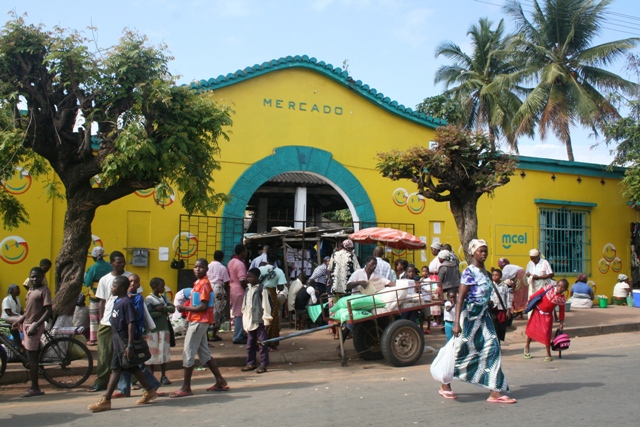 try
the police, they've helped us out in lots of other countries. But
maybe not, we've heard plenty of horror stories about Mozambican
authorities extorting outrageous sums from hapless travelers. The
last guy we talked to, a weathered diamond merchant who's been bouncing
around Africa for the better part of a century, wisely advised us to
keep our money well stashed away and not to pay bribes in excess of the
equivalent of 10 USD. They'll
ask for more, mates, but just stand firm, they're greedy bastards but a
tenner should be enough to get you out of a bind. No, such
advice didn't exactly inspire confidence in the forces of law and
order. A church. Now that's a good idea, and look, there's
a brand new one just ahead.
try
the police, they've helped us out in lots of other countries. But
maybe not, we've heard plenty of horror stories about Mozambican
authorities extorting outrageous sums from hapless travelers. The
last guy we talked to, a weathered diamond merchant who's been bouncing
around Africa for the better part of a century, wisely advised us to
keep our money well stashed away and not to pay bribes in excess of the
equivalent of 10 USD. They'll
ask for more, mates, but just stand firm, they're greedy bastards but a
tenner should be enough to get you out of a bind. No, such
advice didn't exactly inspire confidence in the forces of law and
order. A church. Now that's a good idea, and look, there's
a brand new one just ahead. Fala ingles? we ask the well dressed young man who came out to see what in the world two scruffy-looking tourists on bicycles were doing hanging out in the church parking lot.
Nao, was the response and a gentle shake of the head.
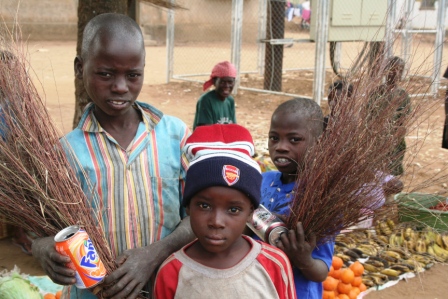 And suddenly my normally quiet and timid husband broke forth into a
barrage of foreign words, not exactly proper Portuguese, but I think
the time he spent studying the phrase book while I snuck an extra hour
of sleep (9 seems to suit me well) had paid off. The boy dashes
off to consult with el padre
and a few minutes later a small army of young men in trousers and ties
are carting our luggage up to a small room above the sanctuary where it
was decided that we were to spend the night. Later someone
appears pushing a wheelbarrow with two bright yellow jerry cans filled
with water for our bathing needs and another turns up with a bottle of
expensive mineral water (surely foreigners don't drink tap water, they
must have concluded) and two loaves of delicious Portuguese style
bread.
And suddenly my normally quiet and timid husband broke forth into a
barrage of foreign words, not exactly proper Portuguese, but I think
the time he spent studying the phrase book while I snuck an extra hour
of sleep (9 seems to suit me well) had paid off. The boy dashes
off to consult with el padre
and a few minutes later a small army of young men in trousers and ties
are carting our luggage up to a small room above the sanctuary where it
was decided that we were to spend the night. Later someone
appears pushing a wheelbarrow with two bright yellow jerry cans filled
with water for our bathing needs and another turns up with a bottle of
expensive mineral water (surely foreigners don't drink tap water, they
must have concluded) and two loaves of delicious Portuguese style
bread. 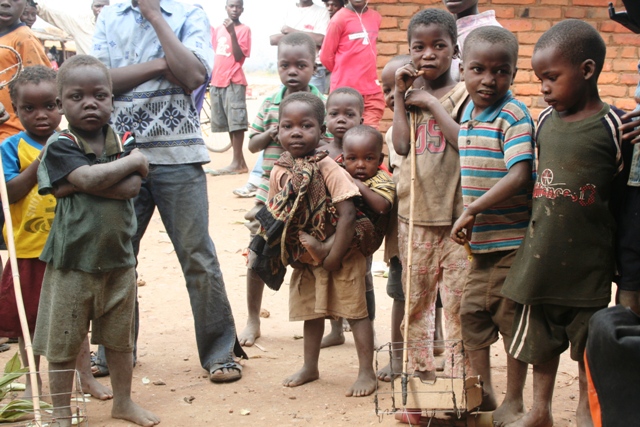 That was our first taste of Mozambican hospitality and it was a fair
indication of what was to come over the next three weeks as we made our
way north along the coast. At a teacher's training college we
were given the keys to a 3 bedroom house and told to make ourselves at
home, several times we were accommodated at local health centers and
schools and even the police sorted us out with camping at the municipal
headquarters. And contrary to all the stories we'd heard, they
were a friendly and accommodating bunch. The god of cyclists is obviously watching over us.
That was our first taste of Mozambican hospitality and it was a fair
indication of what was to come over the next three weeks as we made our
way north along the coast. At a teacher's training college we
were given the keys to a 3 bedroom house and told to make ourselves at
home, several times we were accommodated at local health centers and
schools and even the police sorted us out with camping at the municipal
headquarters. And contrary to all the stories we'd heard, they
were a friendly and accommodating bunch. The god of cyclists is obviously watching over us.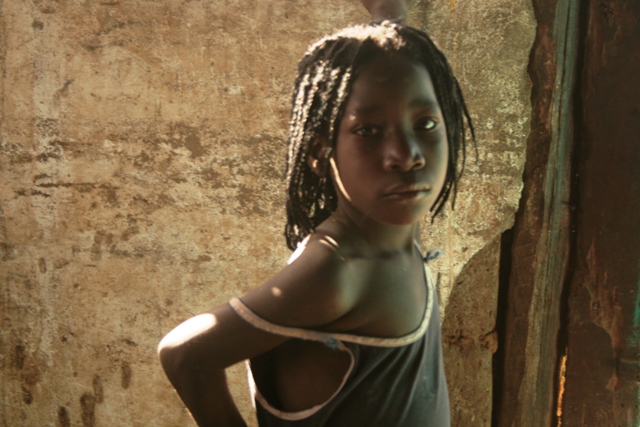 After our night at the church, a short ride brought us to Maputo, which
looked like it was doing a good job of putting itself back together
after the civil war. We were trying to track down Arsenio from
Hospitality Club who was meant to host us. Passersby were more
than willing to direct us in the right vicinity but we were having a
hard time pinning down the actual address until one kind woman took it
upon herself to phone up Arsenio on her mobile phone and get directions
from the very spot we were at. Later she sent him a text message
just to make sure we'd arrived alright. Now, that's going out of
your way to look after strangers.
After our night at the church, a short ride brought us to Maputo, which
looked like it was doing a good job of putting itself back together
after the civil war. We were trying to track down Arsenio from
Hospitality Club who was meant to host us. Passersby were more
than willing to direct us in the right vicinity but we were having a
hard time pinning down the actual address until one kind woman took it
upon herself to phone up Arsenio on her mobile phone and get directions
from the very spot we were at. Later she sent him a text message
just to make sure we'd arrived alright. Now, that's going out of
your way to look after strangers.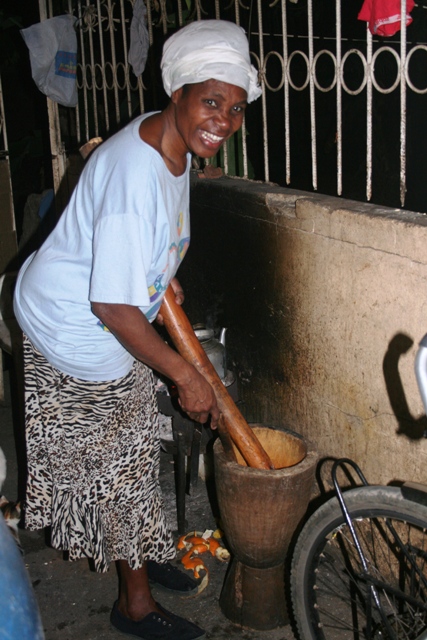 Arsenio
was at work, but had hung up a banner on the front door welcoming
us and instructed his younger sister to look after us. We were
given his room and he slept on the couch in the living room with his
little brother. His two sisters and his baby niece took another
room and his hardworking mother had a room to herself. Maputo's
an expensive city and life's not easy. The family apartment was
comfortable enough inside, but not in the sort of neighborhood I would
have dared venture into a few years ago. Something reminiscent of
a Boyz in the Hood ghetto from first glance.
Arsenio
was at work, but had hung up a banner on the front door welcoming
us and instructed his younger sister to look after us. We were
given his room and he slept on the couch in the living room with his
little brother. His two sisters and his baby niece took another
room and his hardworking mother had a room to herself. Maputo's
an expensive city and life's not easy. The family apartment was
comfortable enough inside, but not in the sort of neighborhood I would
have dared venture into a few years ago. Something reminiscent of
a Boyz in the Hood ghetto from first glance.But travel's about getting out of your comfort zone and getting beyond pre-conceived ideas, so I didn't' flea when I first saw the flat and check into the local backpackers. Plus Eric wouldn't let me. How could you even think of doing such a thing? I've been in contact with the guy for months and he's obviously expecting us. I was ashamed of myself, and rightly so.
Arsenio's a giant at well over 6 feet, and he's got a giant heart to match. Mom came home from work early, slaughtered a chicken on the balcony, plucked off all its feathers and boiled it up in a big pot with a delicious melange of spices she'd ground up in an oversized wooden mortar. She cooked on the balcony over a bed of hot coals that sputtered and set off sparks that scared the kitten and the baby.
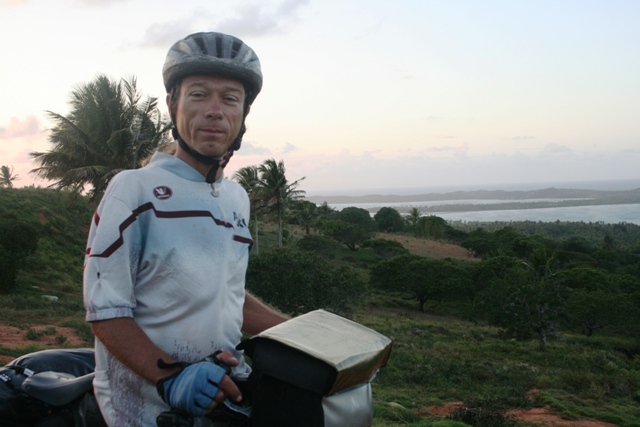 There
was a chill in the air early the next morning as we set off towards
Inhambane. Nothing like the cold in South Africa, but not how
most people picture Africa. After fighting our way through the
busy markets and dusty industrial areas of town, we finally made
it out to the open highway and felt the full force of the coastal
breeze. Were the cycling gods trying to blow us back to South
Africa? We found a nice spot amongst the coconut palms to indulge
in a bit of contemplation and finish off the last of our peanut butter.
There
was a chill in the air early the next morning as we set off towards
Inhambane. Nothing like the cold in South Africa, but not how
most people picture Africa. After fighting our way through the
busy markets and dusty industrial areas of town, we finally made
it out to the open highway and felt the full force of the coastal
breeze. Were the cycling gods trying to blow us back to South
Africa? We found a nice spot amongst the coconut palms to indulge
in a bit of contemplation and finish off the last of our peanut butter.3,000 more kilometers on the same road just to reach the Tanzania border. That's a long way on a bicycle. More than a month's riding winding our way along the coast on the National 1.
Maybe we should hitch a ride on a truck.
Are you crazy? It was my turn to be incredulous.
We packed up our things and forged on fighting the headwind. Are you crazy? It was my turn to be incredulous.
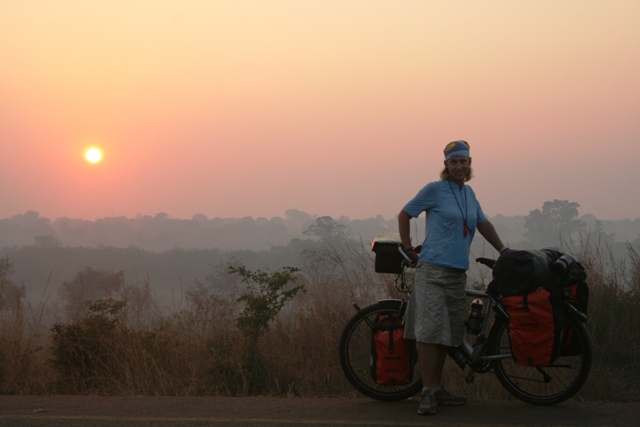 After a few days we tired of looking at the endless coconut palms and
started wishing for a change of scenery. The cycling gods were
listening and quite suddenly the palms gave way to baobabs and we were
back in the bush. There are few sights more beautiful than the
sun rising through the mist in a landscape studded with gnarled baobabs
and acacias or the spectacular pinks and oranges that light up the sky
at sunset. The
enormous star-filled midnight sky and eerie silence of the bush are
almost breathtaking. But
After a few days we tired of looking at the endless coconut palms and
started wishing for a change of scenery. The cycling gods were
listening and quite suddenly the palms gave way to baobabs and we were
back in the bush. There are few sights more beautiful than the
sun rising through the mist in a landscape studded with gnarled baobabs
and acacias or the spectacular pinks and oranges that light up the sky
at sunset. The
enormous star-filled midnight sky and eerie silence of the bush are
almost breathtaking. But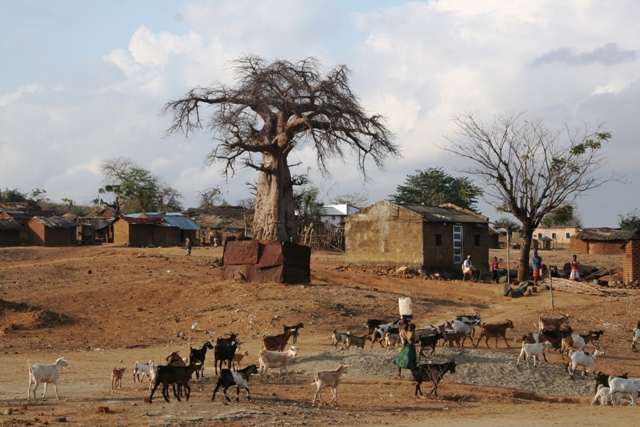 riding through monotonous bush
for days on end as the sun scorches you is of limited interest for
those other than masochists who derive pleasure from being pitied by
others.
riding through monotonous bush
for days on end as the sun scorches you is of limited interest for
those other than masochists who derive pleasure from being pitied by
others. Mozambique does have 2,500 kilometers (1500 miles) of spectacular coastline with sandy white beaches. It's just that most of this coast is backed by bush and that's what you see when you travel up the N1. You've got to make a few detours to take in the sights that make Mozambique such a magnet for the South Africans that drive up in droves.
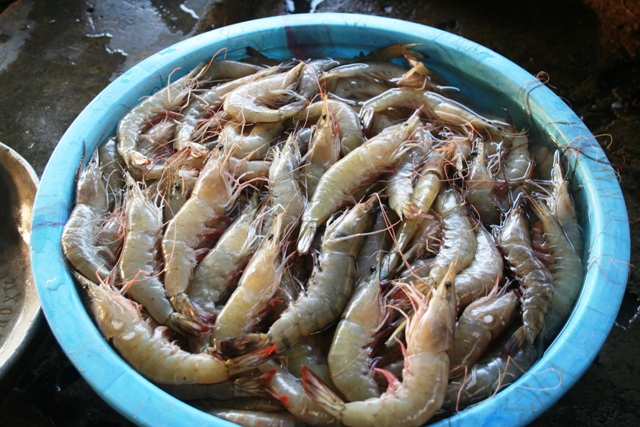 Our
first little seaside holiday was in the old colonial town of Inhambane
and the nearby beach of Tofo. Guide books often rave about faded
colonial charm, and for once a place lived up to all the hype.
There really were broad tree-lined streets, and outdoor cafes, a
bustling port where dhows ferry passengers across the bay and a
colorful mercado municipal
where, for a pittance, we feasted on a huge plate of calamari and
salad. Grilled prawns bought from a group of ladies who'd set up
shop roadside were the next day's treat as we spent the day lazing on
the beach.
Our
first little seaside holiday was in the old colonial town of Inhambane
and the nearby beach of Tofo. Guide books often rave about faded
colonial charm, and for once a place lived up to all the hype.
There really were broad tree-lined streets, and outdoor cafes, a
bustling port where dhows ferry passengers across the bay and a
colorful mercado municipal
where, for a pittance, we feasted on a huge plate of calamari and
salad. Grilled prawns bought from a group of ladies who'd set up
shop roadside were the next day's treat as we spent the day lazing on
the beach. 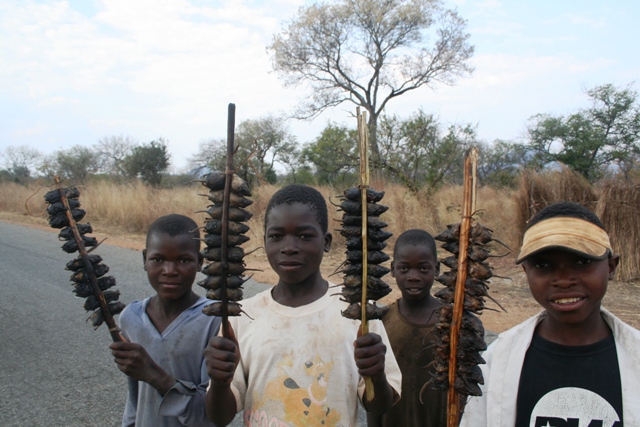 Food
is always a major preoccupation with us. During a year and a half
in Africa we've seen plenty of things being served up to eat that
wouldn't normally make it on the dinner plate back home: monkey, snake,
bush rat, crocodile just to name a few. But the gang of boys
storming us with their fried mice kebabs was still cause for a few
gasps and cries of No, no, I don't want, no matter how cheap the price. Yuck!
Apparently truckers find those mice rather tasty and the boys can
make a good living hawking them by the side of the road.
Food
is always a major preoccupation with us. During a year and a half
in Africa we've seen plenty of things being served up to eat that
wouldn't normally make it on the dinner plate back home: monkey, snake,
bush rat, crocodile just to name a few. But the gang of boys
storming us with their fried mice kebabs was still cause for a few
gasps and cries of No, no, I don't want, no matter how cheap the price. Yuck!
Apparently truckers find those mice rather tasty and the boys can
make a good living hawking them by the side of the road. 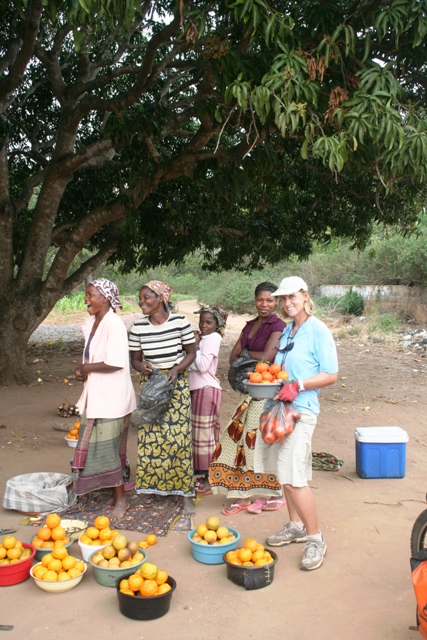 They
didn't get our business. Our money went for the juicy
tangerines, sweet pineapples and delicious cashews being sold roadside.
After the Portuguese pulled out of Mozambique in the 70's their
estates were divided up amongst the local people who now farm
them, mostly on a subsistence level, as they lack the means to farm on
a scale large enough to make exporting viable. What that means is
that for 20 kilometers or so there are people dotting the road all
trying to sell you their oranges at ridiculously low prices since
there's so much supply, 50 kilometers on, the same situation with
pineapples, and then it's a former cashew plantation you're passing and
you can get those for almost nothing. It's a pity, really,
because there's so much waste, especially with the tangerines that you
can sometimes see rotting by the side of the road.
They
didn't get our business. Our money went for the juicy
tangerines, sweet pineapples and delicious cashews being sold roadside.
After the Portuguese pulled out of Mozambique in the 70's their
estates were divided up amongst the local people who now farm
them, mostly on a subsistence level, as they lack the means to farm on
a scale large enough to make exporting viable. What that means is
that for 20 kilometers or so there are people dotting the road all
trying to sell you their oranges at ridiculously low prices since
there's so much supply, 50 kilometers on, the same situation with
pineapples, and then it's a former cashew plantation you're passing and
you can get those for almost nothing. It's a pity, really,
because there's so much waste, especially with the tangerines that you
can sometimes see rotting by the side of the road.We met lots of interesting people in Mozambique, and heard some fascinating life stories. Stewart, a 26-year-old (white)Zimbabwean, is running a huge farm with over 400 workers near Chimoio after his family was forced off their land (with zero compensation) in the late 90's by some of Mugabe's 'war veterans'. At the time the gum trees his father had planted were valued at approximately 2 million USD. Once the 'war veterans' took over, they chopped down the trees and sold them for firewood. Now the land lies fallow. Before fleeing their farm, Stewart and his family faced daily death threats, and when he was just 19 he was severely beaten to within inches of his life. Still Stewart says he wants nothing more than to return to Zimbabwe - once Bob and his goons are out of government.
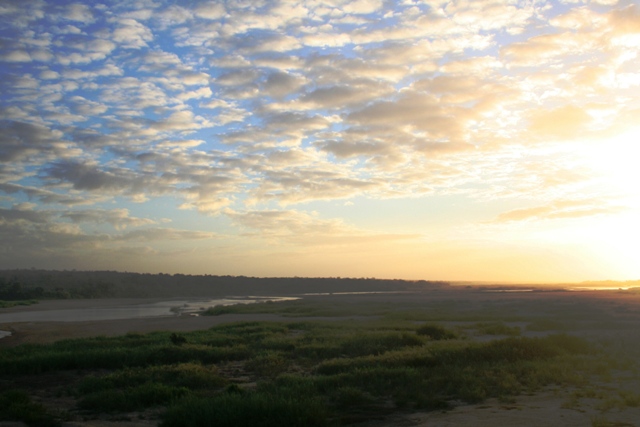 At
the health center where we camped near Inchope I was wandering around
looking for the water pump (there must be one I reasoned, they've got
to have water at a hospital) and asked a group of women for help.
They were squatting on their haunches in the dusty courtyard
cooking over open fires when I made my inquiry. One woman heaved
herself to her feet, and it was then that I realized all the women were
very pregnant. Ah, the maternity ward. A hospital stay in
rural Mozambique doesn't come with catering services and the 'patients'
have got to cook, clean and wash clothes for themselves. As the
women accompanied me to the pump, we got to chatting---I was making
headway with my pidgin Portuguese which was really bad Spanish with
some sh sounds thrown
in--anyway, we could communicate and I learned that she was 27 and
expecting her 5th(!) child. We walked and walked and still no
sign of the pump. Finally she pointed into the distance across an
open field..la bomba de agua.
Was she kidding? Too far for me to possibly walk even with
my small bucket of water. How were these pregnant women possibly
expected to fetch water more than a kilometer away, balance the bucket
on the top their heads and then trudge back to their simple
lodgings(one big room where the ladies unfurl sleeping mats at night).
I went back to the tent, sent Eric on his bicycle and thought
about how easy we have it in the West.
At
the health center where we camped near Inchope I was wandering around
looking for the water pump (there must be one I reasoned, they've got
to have water at a hospital) and asked a group of women for help.
They were squatting on their haunches in the dusty courtyard
cooking over open fires when I made my inquiry. One woman heaved
herself to her feet, and it was then that I realized all the women were
very pregnant. Ah, the maternity ward. A hospital stay in
rural Mozambique doesn't come with catering services and the 'patients'
have got to cook, clean and wash clothes for themselves. As the
women accompanied me to the pump, we got to chatting---I was making
headway with my pidgin Portuguese which was really bad Spanish with
some sh sounds thrown
in--anyway, we could communicate and I learned that she was 27 and
expecting her 5th(!) child. We walked and walked and still no
sign of the pump. Finally she pointed into the distance across an
open field..la bomba de agua.
Was she kidding? Too far for me to possibly walk even with
my small bucket of water. How were these pregnant women possibly
expected to fetch water more than a kilometer away, balance the bucket
on the top their heads and then trudge back to their simple
lodgings(one big room where the ladies unfurl sleeping mats at night).
I went back to the tent, sent Eric on his bicycle and thought
about how easy we have it in the West.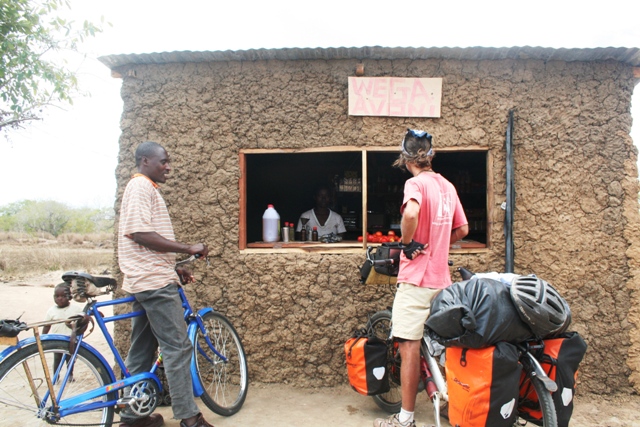
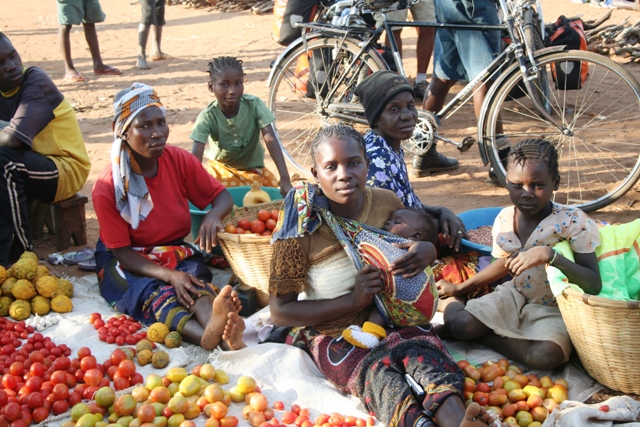
Mozambique is a poor country and people have got to be enterprising to make a living. One afternoon we stopped in a small village along the main highway to fix ourselves tomato and egg sandwiches and relax under one of the shady trees. The village was typical of many all over Africa. On one side of the road women had spread out a smattering of tomatoes and onions and were trying to sell them to people in passing vehicles. There were a few mud shacks selling beer, coca-cola, biscuits and a few essentials like batteries, Omo and candles.
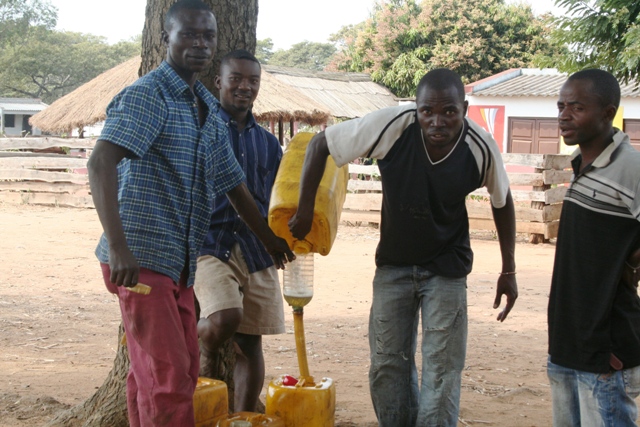 In
the distance we could hear the violent sounds of a kung-fu movie which
meant someone had got hold of a DVD player and was operating an
informal cinema. But what about those guys with the jerry
cans? What are they up to? In turns out they were buying
and re-selling petrol. Tankers coming in from Zambia would let
them siphon off a bit of their fuel which was meant to be delivered to
nearby filling stations, and then the guys would resell it to mini-bus
drivers and motorists at a lower rate than the petrol stations.
It was a win-win situation for the villagers, the truck drivers
and the motorists. They only people who lost out were the petrol
suppliers who lost a bit of money due to the extra "leakage".
In
the distance we could hear the violent sounds of a kung-fu movie which
meant someone had got hold of a DVD player and was operating an
informal cinema. But what about those guys with the jerry
cans? What are they up to? In turns out they were buying
and re-selling petrol. Tankers coming in from Zambia would let
them siphon off a bit of their fuel which was meant to be delivered to
nearby filling stations, and then the guys would resell it to mini-bus
drivers and motorists at a lower rate than the petrol stations.
It was a win-win situation for the villagers, the truck drivers
and the motorists. They only people who lost out were the petrol
suppliers who lost a bit of money due to the extra "leakage".In the end, we decided not to continue all the way up through Northern Mozambique and into Tanzania. We cut through arid Central Mozambique, crossed the mighty Zambezi at Tete and crossed the border at Mwanza into Malawi, where life is easy and there's a comfortable campsite every 50 kilometers. Certainly not as adventurous as washed out bridges, muddy tracks and rides in dugout canoes, which is what we could expect in Northern Mozambique, but another ride around lovely Lake Malawi also has its allure.
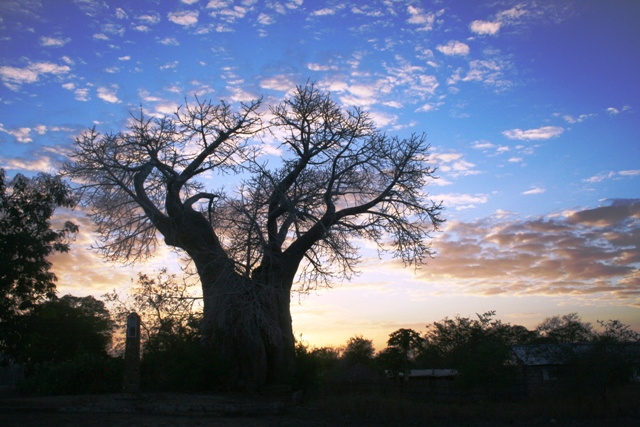
contact us at: worldbiking@gmail.com
Support our chosen charity and help educate girls in Africa-more info here
